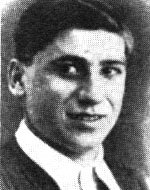Mashkit, Israel-Mordechai
Son of Malka and Shlomo Nachum. He was born on February 19, 1921 in Kishinev, Bessarabia. In 1935, after completing elementary school, he immigrated to Israel with his parents and lived in his sister’s home in Ein Vered, where he acquired the knowledge of the Hebrew language. Israel, striving to be absorbed quickly and become a real “sabra”, began reading and writing Hebrew in a short time, with persistence and strong will. Due to the difficult economic situation and in order not to fall into a burden on relatives, Israel went to work in the orchard. The sense of independence and the real economic aid resulting from this work strengthened his image in his own eyes. He spent a year at Kibbutz Ramat Hakovesh, where he studied the various branches of the agriculture and knew his problems. However, the kibbutz life did not seem appropriate and he preferred the moshav’s life. When he returned from his training year to Ein Vered, he continued to work in the orchard, but he aspired to make progress from picking work that did not require knowledge and learned the packaging profession. He specialized in packaging, took the necessary exams and was accepted as a member of the “Rice” Association. When the Jewish Agency announced the mobilization, Israel doubted that the villagers should also enlist because they would not have a replacement in the field. In June 1940, he enlisted in the Palestine Expeditionary Force and served in Egypt and Greece. On April 23, 1941, Israel fell captive and was transferred to Germany, where he worked in the coal mines. Due to his diligence at work, he was appointed as the foreman by the Germans. He was very active in providing help and smuggling food and clothing to the Jews of the camps that were nearby, and despite the great risk involved in this activity, he dealt in it. In captivity he organized friends for the establishment of a working-class of discharged soldiers, but failed to realize his dream. On May 9, 1945, immediately after the victory over the Germans, Israel took off with thirty-five former POWs and his good friend from Ramat Hakovesh on their way to England, but while on French soil the plane crashed on its passengers. On the 4th of Sivan 5705 (May 16, 1945) he was buried in a British military cemetery near Paris, and his memory was immortalized in the books “They Went” and “The Scout and the Plow” and in the booklet “The Jewish Soldier.”
